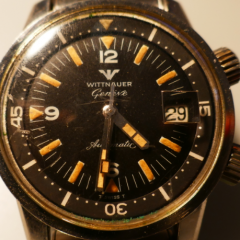Temperamental Omega Constellation
-
Recently Browsing
- No registered users viewing this page.
-
Topics
-
Posts
-
There is one Boynton tool on eBay right now. They were sold in pairs or groups of three. One isn’t that helpful alone. Many on eBay are incomplete, so check them carefully. The safety centres that hold the pivot must be intact and not blocked by a broken pivot, ask for pictures if needbe to verify this. They were also made in a few different sizes, so a given set may not be suitable for the movement you want to use it with. With patience, I managed to get a matching set of 3 quite cheaply, they sell for much less than the other tool and are often poorly described, and therefore attract few bidders. Best Regards, Mark
-
in other words you would like the watch to run before doing anything. Yes a full plate watch that's either not running or not running right is not really a fun watch to work with. just a reminder for the future it seems like everyone wants to play with the banking pins and there only for horn clearance. Then once you verified there were there supposed to be then you then you can check the guard pin. then once those things are verified and where there supposed to be then you can play with your pallet stones.
-
If I remember when I go to work I will ask about the break ability of sapphire. But I was under the impression or my memory says that it's a selling point and I believe at least one of the people says that basically is indestructible. It's also why a lot of times though do upgrade standard glasses this sapphire is this much more.
-
By Neverenoughwatches · Posted
Ah ok thanks, that maybe answers that one then, Cheers fellas 👍 -
From what I've read it is more prone to shatter and exposed edges can chip. But my Breitling has received some hard hits to the sapphire - e.g. when I've accidentally hit it against the corner of a desk, and no visible damage done.
-





Recommended Posts